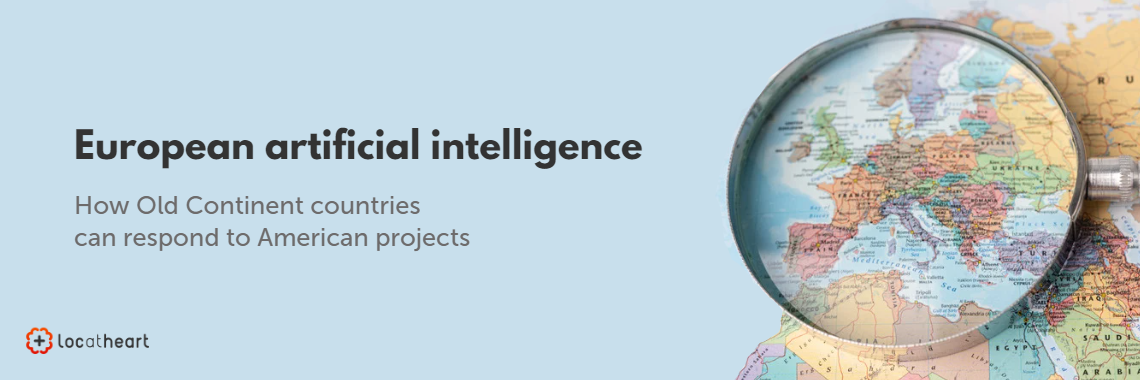European artificial intelligence – how Old Continent countries can respond to American AI projects
Although the very concept of artificial intelligence is still raising a lot of doubts, one thing’s for sure – we’re past the theorising stage and we’re on the verge of a real industrial revolution. ChatGPT, a chat bot created by the American research lab OpenAI, has caused a huge stir all around the world, sparking hope and fuelling fear. A separate issue, however, is whether Europe will have to – once again – come to terms with the fact that the US is taking over a global monopoly in yet another incredibly important and prospective field. Does the Old Continent have the right resources and tools at hand to take on this scientific challenge? Not only that, but should it take it on at all?
We learned the answers to these and other questions on 1 March 2023 at a special online event organised by the company Custom.MT. During one of the panels about the use of ChatGPT, large language models (LLMs) and generative artificial intelligence in the localisation industry some wonderful guests shared their knowledge and opinions: Jochen Hummel (Coreon & ESTeam), Ariane Nabeth-Halber (ViaDialog), Gema Ramírez-Sánchez (Prompsit Language Engineering), and Nicolas Flores-Herr (OpenGPT-X). To find out what topics they covered, read the rest of this article.
One of the issues raised was the need for Europe to rise to the AI challenge and why remaining passive in such a situation would be the worst possible move. As Jochen Hummel pointed out, giving the Americans the monopoly on the development of artificial intelligence would create a number of problems.
Ariane Nabeth-Halber pointed out that if Europe wants to stand a chance in the race against the United States, it must act now. She also noted that large language models require huge amounts of data; however, building these models in several countries and providing them with data from different regions would ensure the desired diversity – everyone should be able to decide on their own which model they want to choose (and thus, what they want to “inherit” along with it). Transparent and open language models that exist within a public infrastructure would allow software to be tailored precisely to individual needs, while keeping the transfer of data private. However, they shouldn’t be created by a single company, but by several research organisations or selected specialists participating in government projects – in France, for example, AI research is supervised by a ministry-appointed national coordinator for the French AI strategy. Another encouraging scenario would be close cooperation between companies and research institutes.
Gema Ramírez-Sánchez, former CEO of the Spanish company Prompsit Language Engineering, was of a similar opinion – she emphasised the need to democratise knowledge and work as a community. She also stressed the importance of creating fully open and widely available infrastructures and further decentralising technological power. As noted by Ramírez-Sánchez, Europe has huge potential – it has a plethora of hyper-efficient computing centres within its borders, which can contribute to faster and more sustainable development of artificial intelligence. The language industry is essential to this process, as the end-results and efficiency of AI-generated content must be evaluated for grammatical and lexical correctness, as well as response and cultural bias. But to succeed, huge amounts of data will be needed to train the models, and that’s already posing a serious problem – in the case of some European countries, it’s been found that not enough local material is available. A good and realistic solution would be to use Internet Archive sources or to gain access to the wealth of non-sensitive data collected by country-specific governments (these collections include climate, statistical or geological information, among other things – author’s note).
Nicolas Flores-Herr also agreed that Europe needs to move quickly and get access to a huge amount of text – technological domination is at stake here, and we’ve got plenty to lose. Rapid development is more important than ever, especially since some results can only be counted on from a certain level; and development must go hand in hand with research progress and new findings. Areas that are worth focusing on – and even need to be focused on – are conversational artificial intelligence, document analytics, and plain language translation.
Europe should definitely make its move and propose its own alternative to the American solutions, especially given the fact that it has all the necessary tools at its disposal (at least in theory). Still, there are a number of obstacles to overcome, such as insufficient resources, the relatively small amount of data needed to train the models, and the significant lead of the United States. It’s important to remember that this isn’t about a mindless race, pride, or ambition – it’s about linguistic and technological equality. Only by offering diverse and widely available solutions can we begin to talk about democratising AI models.
Source: Custom.MT, ChatGPT in Localization. „Research panel: Pathways to a European GPT”. Moderator: Konstantin Dranch. Online event, 1 March 2023: https://www.youtube.com/watch?v=jM91CdLXuog



![Customer self-service in the digital age [featured image] - translation agency LocAtHeart](https://locatheart.com/wp-content/uploads/2021/11/1-450x231.png)


Leave a Reply